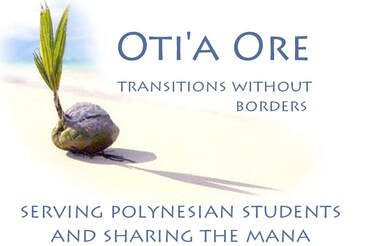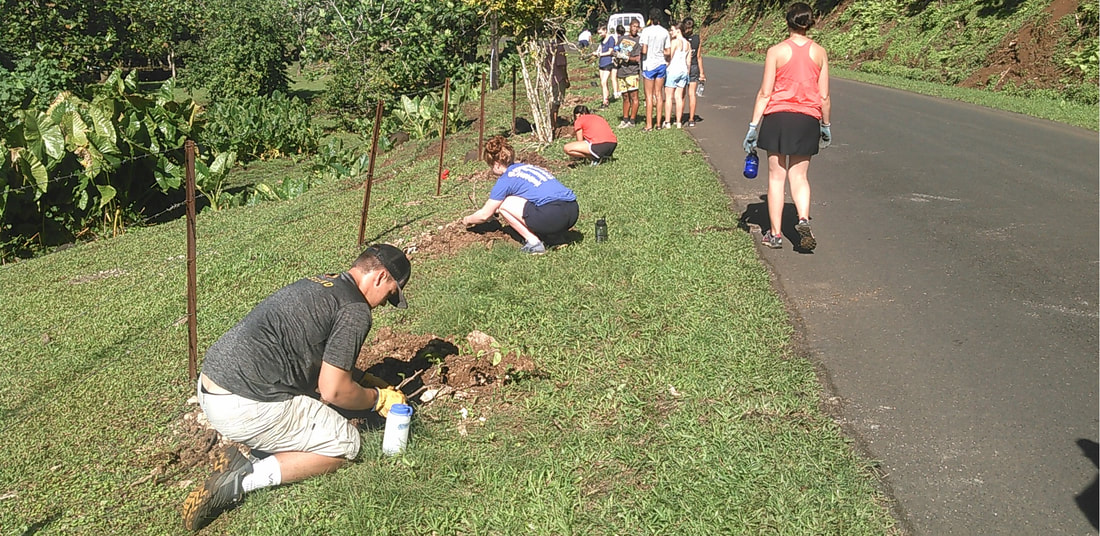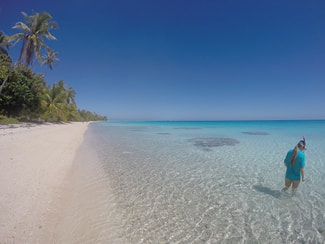
The main goal of our gap programs for international students, is to contribute to supporting and educating underserved and disadvantaged Polynesian students. Our programs prepare students to become caring and committed citizens, and community leaders. Our experiential programs are custom-designed and tailored to the school, organization, or individual students, according to their goals, interests and strengths. They focus on a variety of pertinent themes, from Polynesian culture and service, to language and ecology, science and world citizenship.
How might a gap program look like?
For a student whose main goals are to discover a new culture and practice their French language skills, it could be living with a host family in a remote village and experience the 100% authentic island life eg learning different techniques of fishing both during the day and at night; help clean and prepare fish Polynesian style; work on the family's plantations and learn about tropical plants, flowers and trees; feed their chickens and pigs; learn to make coconut oil; bottle fresh coconut water to sell at the markets; practice Polynesian drumming, singing and ukulele; take the boat to the 'motu' or nearby islands; experience life with no phone, internet or shopping. No classroom instruction can offer so much language and cultural immersion!
For a student who has environmental sustainability learning goals, it could be assisting a PhD student work on their research to find solutions to the impact of the rising of water temperatures on reef organisms; engaging with a selected local NGO to replant corals; building a protected marine area; saving an endemic flower, bird or snail found only on Polynesian islands; assisting or creating awareness programs; working with the village authorities on their new solar powering or composting project.
The school, organization or students drive our programs, not the other way around. We tailor to each person or organization's needs, preferences and time constraints, provided they are in line with our mission. We work with individual students, or with groups of 20-25.
How might a gap program look like?
For a student whose main goals are to discover a new culture and practice their French language skills, it could be living with a host family in a remote village and experience the 100% authentic island life eg learning different techniques of fishing both during the day and at night; help clean and prepare fish Polynesian style; work on the family's plantations and learn about tropical plants, flowers and trees; feed their chickens and pigs; learn to make coconut oil; bottle fresh coconut water to sell at the markets; practice Polynesian drumming, singing and ukulele; take the boat to the 'motu' or nearby islands; experience life with no phone, internet or shopping. No classroom instruction can offer so much language and cultural immersion!
For a student who has environmental sustainability learning goals, it could be assisting a PhD student work on their research to find solutions to the impact of the rising of water temperatures on reef organisms; engaging with a selected local NGO to replant corals; building a protected marine area; saving an endemic flower, bird or snail found only on Polynesian islands; assisting or creating awareness programs; working with the village authorities on their new solar powering or composting project.
The school, organization or students drive our programs, not the other way around. We tailor to each person or organization's needs, preferences and time constraints, provided they are in line with our mission. We work with individual students, or with groups of 20-25.
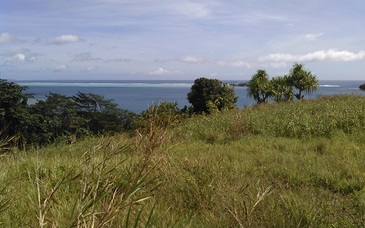
Students choose to live either at our boarding house... or with a host family.
Our boarding house is the first of its kind on the islands of French Polynesia. We create tailor-made programs for individuals and schools to give them a meaningful experience. Students not only have the opportunity to live and learn Polynesian culture beyond its folklore; they share their knowledge, talents and skills with the local community. Whether the goal is to preserve the islands' culture, promote resource conservation, or support our local kids, students build and develop their own ideas and projects to make a positive impact on the community, with the support and mentorship of our dedicated educators, local field professionals, industry experts, and Polynesian students.
They interact daily and build long-lasting relationships with our students, with their host family, the villagers, Polynesian authorities, artists, fishermen, farmers, and many layers of Polynesian society. They acquire knowledge of nature and survival skills from the wise Polynesian "metua". By being immersed in their project from its inception, students develop entrepreneurial, leadership and organizational skills. From teaching English and sharing their talents, to working the land and planting corals with local students to preserve the lagoon, the students' areas of action will be as diverse, innovative and stimulating as their interests, skills and ambitions. Their work to support underserved young Polynesians contributes at the same time, to the leveling of the playing field, and to the development of our island communities.
Eco-Living: We are currently designing a permaculture garden on our facilities, with the goal of supplying the boarding house with fresh produce. With the help of our experts in the field, students learn about renewable energies, sustainable agriculture, including soil analysis, organic gardening, water planning and irrigation, composting, ecosystem garden support, and earth-friendly living.
Our boarding house is the first of its kind on the islands of French Polynesia. We create tailor-made programs for individuals and schools to give them a meaningful experience. Students not only have the opportunity to live and learn Polynesian culture beyond its folklore; they share their knowledge, talents and skills with the local community. Whether the goal is to preserve the islands' culture, promote resource conservation, or support our local kids, students build and develop their own ideas and projects to make a positive impact on the community, with the support and mentorship of our dedicated educators, local field professionals, industry experts, and Polynesian students.
They interact daily and build long-lasting relationships with our students, with their host family, the villagers, Polynesian authorities, artists, fishermen, farmers, and many layers of Polynesian society. They acquire knowledge of nature and survival skills from the wise Polynesian "metua". By being immersed in their project from its inception, students develop entrepreneurial, leadership and organizational skills. From teaching English and sharing their talents, to working the land and planting corals with local students to preserve the lagoon, the students' areas of action will be as diverse, innovative and stimulating as their interests, skills and ambitions. Their work to support underserved young Polynesians contributes at the same time, to the leveling of the playing field, and to the development of our island communities.
Eco-Living: We are currently designing a permaculture garden on our facilities, with the goal of supplying the boarding house with fresh produce. With the help of our experts in the field, students learn about renewable energies, sustainable agriculture, including soil analysis, organic gardening, water planning and irrigation, composting, ecosystem garden support, and earth-friendly living.
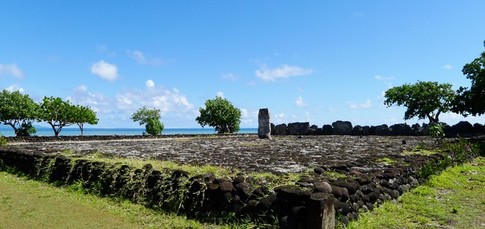
Service Learning: Students have the opportunity to reach out to the local communities in the islands where our programs take place. One of our sites is in Raiatea where lays the marae of Taputapuatea, inscribed in 2017 as a Unesco World Heritage. It is a vast temple-grounds regarded as the center of Polynesian civilization, the nesting place of Polynesian culture and the original place from which the Polynesian people adventured, sailing north to Hawaii, west to New Zealand and east to Easter Island, forming the famed Polynesian triangle. Our international visiting students and guests have volunteered and helped one of the local organizations preserve and promote this significant cultural and religious emblem. They also taught English and created after-school and holiday activities for the locals. These are a few examples of our students' experiential learning on our Polynesian islands.
Learn a language [or two]: Practice and improve your French skills. In addition to daily French immersion, weekly lessons are an option. For a new and unique language experience, students can also try Tahitian / Maohi.
Be immersed in ecology, sustainability, ocean and land science: We work with local organizations and experts, public authorities, as well as top university and national research centers to give our students and guests the opportunities of discovery, study and research on the impact of climate change, as well as topics in environmental science and ecology. Learning happens in traditional classrooms, as well as in "nature-as-classroom"
Learn a language [or two]: Practice and improve your French skills. In addition to daily French immersion, weekly lessons are an option. For a new and unique language experience, students can also try Tahitian / Maohi.
Be immersed in ecology, sustainability, ocean and land science: We work with local organizations and experts, public authorities, as well as top university and national research centers to give our students and guests the opportunities of discovery, study and research on the impact of climate change, as well as topics in environmental science and ecology. Learning happens in traditional classrooms, as well as in "nature-as-classroom"
Live like a Local: Students are fully immersed in Polynesian culture through life with the locals, work and participation in indigenous activities such as fishing, arts, crafts, music, dancing and cooking.
Contact us at: [email protected] to design your group or individual gap program
Contact us at: [email protected] to design your group or individual gap program
